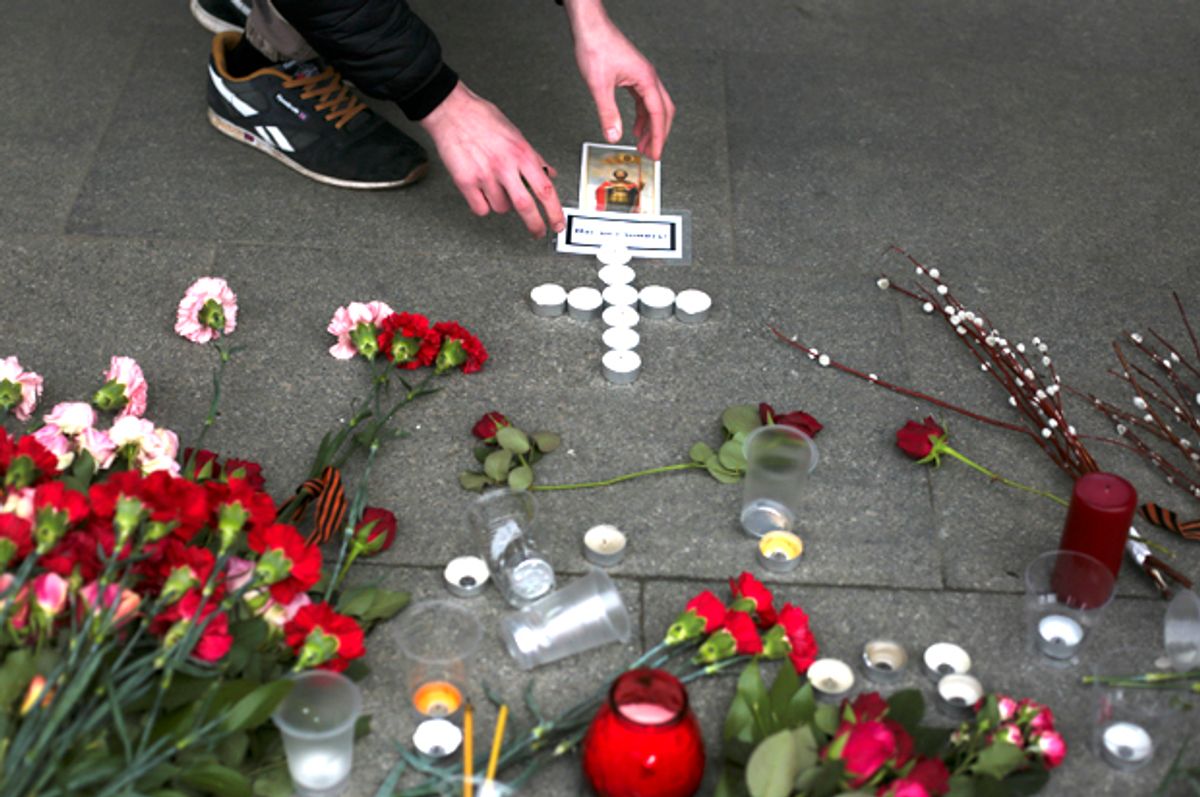On Monday 14 people lost their lives and 50 others were injured when a terrorist detonated a nail bomb on the St. Petersburg metro.
In the videos that emerged on social media, blood is streaked across the platform where bodies lie motionless. A child can be heard repeatedly screaming, “mama” in the background. A woman sits on the ground crying. A man on the scene calls, “Give me your hand!” as he helps survivors climb through the destroyed train doors. At other points in the videos, all that can be heard are bloodcurdling screams.
Later tragic stories began to emerge, including one about a woman who threw herself over her 29-year-old daughter’s body and died saving her life.
When the blast went off, train driver Alexander Kaverin, kept to protocol and continued driving the train to the next station so victims in need of medical attention would not be stuck in the underground tunnel.
When a tragedy like this strikes a Western city, we have a perfected and well-established response: We change our profile pictures on Facebook. We come up with a hashtag. We share encouraging words about how the city’s people will not be cowed by fear. Celebrities tweet their support. Major monuments are lit up in the colors of the flag of the affected country. World leaders pledge to eradicate this “poisonous ideology” once and for all.
But the dust had barely settled at Sennaya station when it became clear that the conventional response would no longer suffice. Almost immediately the blame game and conspiracy theorizing began.
On CNN, BBC, Sky and others, the attack was immediately linked to Russia’s military intervention in Syria. Mere hours after the blast, commentators were referring to the attack as “blowback” for Russia’s foreign policy. This is not a word you hear frequently in the aftermath of terror attacks on European and American cities — despite decades of Western military intervention in the Middle East, with much of it engendering intense resentment among Arabs and Muslims.
The subtext was clear: When terrorists target Western cities, it is an abhorrent attack on our freedoms and way of life, for which there is no excuse and no explanation. When terrorists target the Russians, well, they obviously did something to deserve it.
On the rare occasion that a public figure does speak out to link attacks in the West to American or European foreign policy, they are quickly accused of politicizing the event, denounced as “terrorist sympathizers” and told to get back in their box. This is not so when the target is Russia. Suddenly, it’s perfectly acceptable to blame terror attacks on bombs falling in Syria.
It’s simple, really: Only Vladimir Putin’s foreign policy can be linked to terrorist blowback — never our own. When Russia began its intervention in Syria in 2015, the governments of the U.K., U.S., France, Germany, Qatar, Saudi Arabia and Turkey released a statement claiming that Russian bombs would “fuel more extremism and radicalization.” Former U.S. Defense Secretary Ashton Carter warned there would be “consequences” for Russia. Consequences — another word you don’t hear very much when the victims are Westerners.
What of the Western bombs, then? Have they not “fueled more extremism and radicalization,” too? Did ISIS rise out of the ashes in Iraq because years of Western bombing and ground warfare had produced serenity and calm?
If, God forbid, some crazed lunatic takes the lives of Americans in a new terror attack, will we immediately link it to the killing of 200 civilians by an American airstrike in Iraq last month? Will we link it to the fact that, according to one human rights group, the U.S.-led coalition in Syria killed more civilians in that country last month than Russia did?
These are the facts, yet few among us would dare utter them in the aftermath of an attack on one of our own cities. But maybe we should. The ceaseless bombing of Muslim-majority countries as part of an ongoing geopolitical chess game is bound to produce some unwanted side effects. Violence fuels violence, whether the bombs are American, British, French or Russian.
The theorizing, however, did not stop at highlighting the obvious link with Russian policy in Syria. Some commentators on social media were hungry for even juicier explanations. Perhaps Putin staged the entire thing as a "false flag" operation to distract Russians from his other problems, some hypothesized. There is no evidence for that whatsoever, but hey, let’s just throw it out there for kicks.
But I digress.
On Tuesday after French officials were put “under pressure” to show solidarity with the Russian people, the Eiffel Tower went dark for the victims of the St. Petersburg attack.
In Berlin the Brandenburg Gate, which was illuminated just weeks ago for the four victims of the attack on Westminster Bridge, remained in its usual state. “Only in exceptional circumstances” would the structure be lighted, Berlin officials said when questioned over the lack of a response to Russia’s tragedy.
Exceptional indeed. Our dead are more important than the dead of St. Petersburg, it seems.



Shares